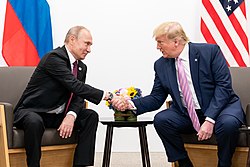This article has multiple issues. Please help improve it or discuss these issues on the talk page . (Learn how and when to remove these messages)
|
| Trump–Russia relations |
|---|
 |
This is a timeline of events related to Russian interference in the 2016 United States elections.
Contents
- Before Donald Trump's 2016 candidacy
- 1977
- 1986
- 1987
- 1991
- 1996
- 2000
- 2001–2004
- 2004
- 2005
- 2006
- 2007
- 2008
- 2009
- 2010
- 2011
- 2012
- 2013
- 2014
- January–June 2015
- Presidential campaign starts: June 2015
- June–December 2015
- January–March 2016
- April 2016
- May 2016
- June 2016
- July 2016 and after
- Post-election transition
- Investigations' continuing timelines
- Related continuing interference
- See also
- Notes
- References
- Further reading
- External links
It includes events described in investigations into the myriad links between Trump associates and Russian officials until July 2016, with July 2016 through election day November 8, 2016, following. [1] Events and investigations also occurred during the presidential transition from November 9, 2016, to January 20, 2017, and continued through the first and second halves of 2017; the first and second halves of 2018, 2019, 2020, and 2021, largely as parts of the Crossfire Hurricane FBI investigation, the Special Counsel investigation, multiple ongoing criminal investigations by several State Attorneys General, and the investigation resulting in the Inspector General report on FBI and DOJ actions in the 2016 election.


